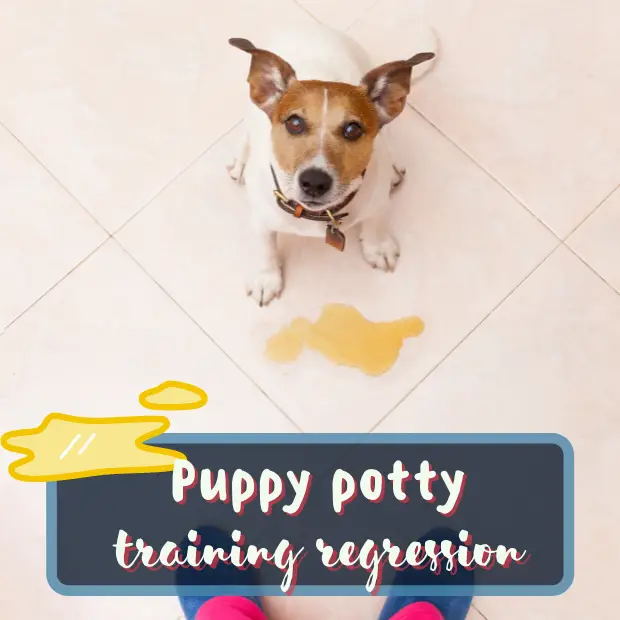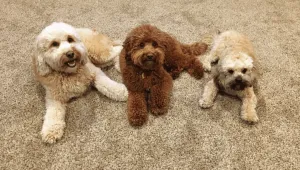It can be so frustrating when your puppy suddenly starts having accidents in the house after weeks or months of successful potty training. But don’t worry, there are ways to deal with puppy potty training regression and get your house back to being accident-free.
In this post, we’ll discuss house breaking regression and offer tips on how to overcome it. So keep reading if you’re experiencing a potty training regression with your pup and want to put an end to it!
Contents of this article:
- Go back to puppy potty training basics.
- Go outside with your puppy at toilet time.
- Using a crate to speed up potty training.
- Watch for signs.
- How to deal with puppy potty training accidents.
- Rule out any medical reasons for puppy potty training regression.
- Don’t restrict your puppy’s water intake.
- Puppy potty training regression is perfectly normal.
Table of Contents
ToggleGo back to puppy potty training basics.
First, make sure that you’re providing plenty of opportunities for your pup to go outside to potty. This means taking them out frequently, especially after they’ve eaten or drunk anything.
Go back to basics, like when they were 8 weeks old. Take them out on a schedule; once every hour, as well as upon waking, after playing and after a meal.
Go outside with your puppy at toilet time.
If you shut them outside they may forget why they’re out there and just want to come back in because they don’t want to be separated from you. Walk around outside with them, but be as dull as you can.
Only once they’ve “performed” should you play with them while they’re outside so that they associate going potty with good things happening afterwards.
Make sure you are rewarding your pup when they do go potty outside. This can be with treats, verbal praise or even just some extra attention and petting.
Using a crate to speed up potty training.
You may also want to consider using a dog crate or exercise pen to confine your pup when you can’t watch them closely, as this will help prevent accidents indoors.
Dogs generally don’t like to soil where they lay, so this can be helpful in keeping things clean until your pup is fully trained, and of course stops your carpets from becoming soiled, making any accidents easier to clean up.
Preventing your dog from rehearsing the unwanted behavior, as well as rewarding the desired behavior will help your puppy catch on quicker.
Watch for signs.
When they’re not in the crate, watch them like a hawk for any signs that they need to go, such as sniffing around or circling. If your puppy starts looking around like they’ve lost something, this can often be a signal.
How to deal with puppy potty training accidents.
If you see them start to go in the house, make a loud noise (like clapping your hands) to startle them and then quickly take them outside.
If your pup does have an accident, be sure to clean it up thoroughly with an enzymatic cleaner to remove the scent and discourage repeat accidents in that spot.
If your puppy has an accident in the house or if you catch them in the act, don’t shout at them or punish them. This will only make them scared of you and confuse them about what they’re supposed to do.
Instead, just take them outside, clean up the mess without any fuss and provide more opportunities for them to go outside.
Rule out any medical reasons for puppy potty training regression.
If your puppy is urinating more frequently or in different amounts than usual, this could be a sign of a medical problem and you should take them to the vet to rule out any underlying causes.
Urinary tract infections are common and can make it difficult for puppies to control their bladder, so it’s important to get this checked out.
Don’t restrict your puppy’s water intake.
Don’t be tempted to restrict access to water in order to reduce the number of toilet trips, as this can be dangerous for your pup and will likely just lead to more accidents indoors.
Your puppy needs access to fresh water at all times to stay healthy and happy.
Puppy potty training regression is perfectly normal.
Keep in mind that many puppies regress with their potty training and this can be pretty normal, especially around 4-6 months old, when puppies are going through a lot of changes.
Dealing with potty training regression can be frustrating, but by following these tips you should be able to help your pup get back on track in no time.
Finally, remain patient and consistent with your potty training regimen and don’t give up – your pup will eventually get the hang of it!
Don’t get discouraged if there are setbacks along the way, everyone has accidents sometimes!
Check out this related article to find out if your puppy is drinking enough water.
Click here to find out whether puppy pads are a good idea.







